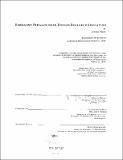Emergent pedagogies in design research education
Author(s)
Press, Joseph
DownloadFull printable version (9.899Mb)
Other Contributors
Massachusetts Institute of Technology. Dept. of Architecture.
Advisor
William L. Porter.
Terms of use
Metadata
Show full item recordAbstract
Recent demand for applied knowledge within architectural practice has resulted in the proliferation of university based research groups. Given the role advanced degree programs play in educating architectural researchers, an opportunity exists to educate architects towards bridging the traditional gap between practice and academia, as well as addressing the dichotomy of research and teaching within the university. Traditionally, research methods from other disciplines are taught in an attempt to redress the research deficiencies of a professional education. This investigation begins with a different premise: the operations of design, central to an architect's intellectual and operational repertoire, should be the catalyst for developing research methods specific to architecture. Further, these methods should be accompanied by a knowledge base which expresses the operations of design. A modified educational paradigm consisting of methods, knowledge, and the building of abilities through 'thoughtful performances', structures an experimental curriculum. Each attribute becomes a dimension for substantiation and assessment. Student engagement and entanglement within this locus reveals the potential directions of design research education. The subsequent analyses of the student work indicates four major trends: Intersubjectivity the need for common understanding; Transparency- the effortless application of methods, Emergence- acknowledgment of form's evolution; and Apprentissage- French for learning which occurs from within apprenticeship. Given these attributes, and the subsequent imperative to redefine architectural research, we formulate a paradigmatic architectural researcher, the "Architect Scholar' and speculate on an educational program designed to foster these characteristics within students.
Description
Thesis (M.S.)--Massachusetts Institute of Technology, Dept. of Architecture, 1997. Includes bibliographical references (leaves 63-64).
Date issued
1997Department
Massachusetts Institute of Technology. Department of ArchitecturePublisher
Massachusetts Institute of Technology
Keywords
Architecture.